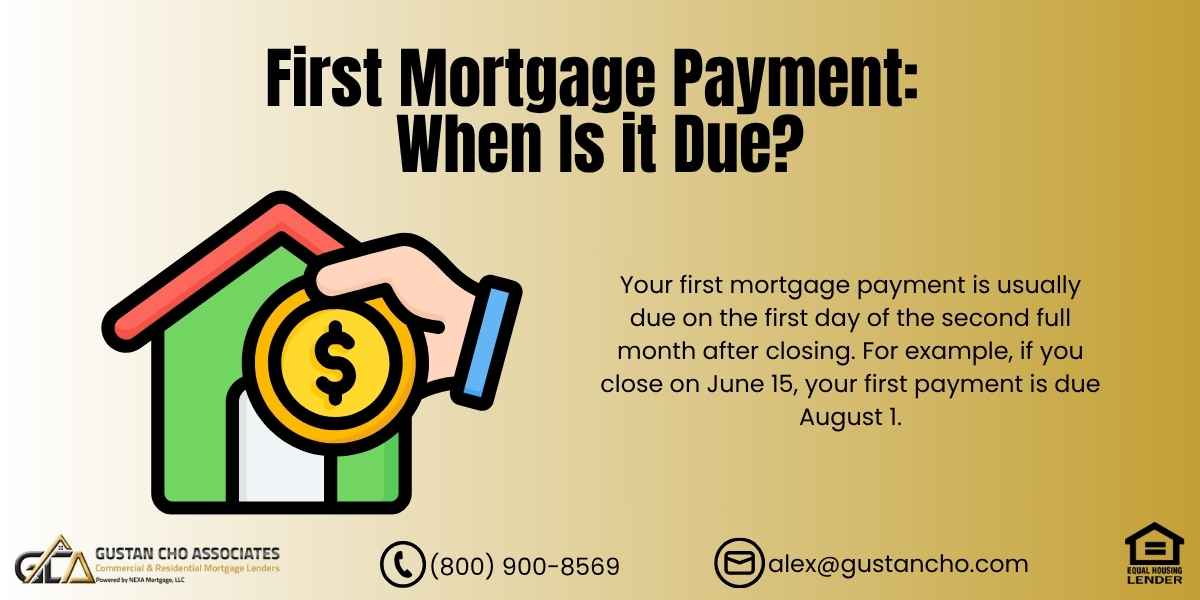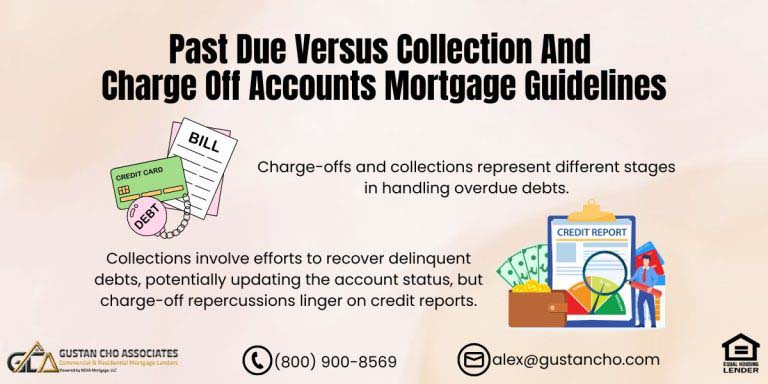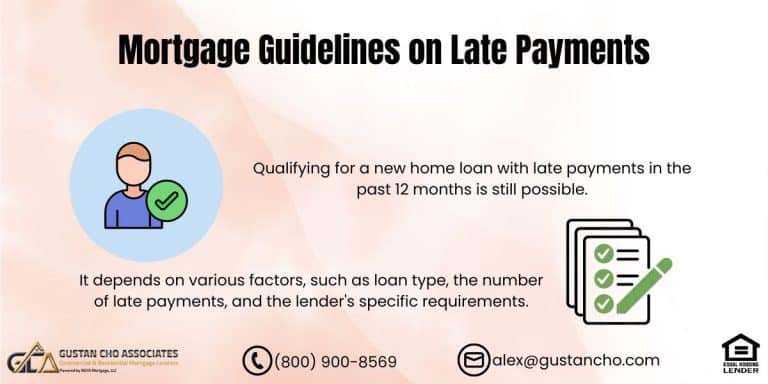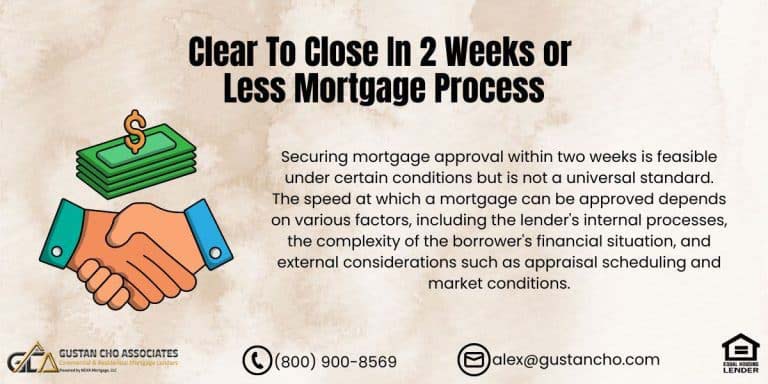Quick Answer: When Is Your First Mortgage Payment Due?
Your first mortgage payment is usually due on the 1st of the month after you’ve owned the home for one full month—often 30–60 days after closing.
Most common timeline: your first payment is due on the first day of the second month after closing.
- Close June 15 → first payment due August 1
- Close September 2 → first payment due November 1
Important: Your exact first payment due date is listed in your Promissory Note and shown on your Closing Disclosure—always confirm it there.
First Payment Date Calculator Rule (Rule of Thumb)
If you want a quick way to estimate your first mortgage payment due date, use this simple rule:
Rule of thumb:
- Find the first day of the following month after your closing date.
- Then go one more month forward — your first payment is usually due on the 1st.
In other words: first payment ≈ the 1st of the second month after closing.
Two quick examples:
- Closing date: June 15 → next month starts July 1 → one more month = August 1 (first payment due)
- Closing date: September 2 → next month starts October 1 → one more month = November 1 (first payment due)
Always verify: Your exact due date is shown on your Promissory Note and Closing Disclosure, and that’s what you should follow.
When Is the First Mortgage Payment Due After Closing?
Your first mortgage payment usually isn’t due until the first day of the second month after you close. So, if you close on June 15, you’ll need to make your first payment on August 1. It’s the same thing if you close on September 2; your payment will be due on November 1.
What’s the reason for the wait? This is because mortgage payments are made in arrears, meaning you are actually covering the interest for the previous month, unlike rent, where you pay in advance for the upcoming month.
Wondering When Your First Mortgage Payment Is Due?
Understand the timeline for your first payment and how to plan for it.
What Does Your First Mortgage Payment Include?
Your first mortgage payment covers a few things. It includes interest from the previous month and some of the principal, and if you have an escrow account, it also covers your taxes and insurance.
Even though your first mortgage payment might not be due until 30–60 days after closing, you’re still being charged interest starting from the day you sign your closing documents. That’s where prepaid interest comes in (more on that below).
Do You Pay a Mortgage at Closing?
You don’t make a full mortgage payment at closing, but pay prepaid interest.
Prepaid interest is the amount of interest from your closing date to the end of that month. So if you close on August 10, you’ll prepay August 10 through August 31 at closing. That way, your first mortgage payment on October 1 will cover the whole month of September.
What to Budget at Closing Because Your First Payment Is Delayed
Even though your first mortgage payment may not be due for 30–60 days, you’ll still need cash at closing to cover several upfront items. This is where many first-time buyers get surprised—because “no payment yet” does not mean “no costs yet.”
Here’s what to budget for:
1) Prepaid Interest (Daily Interest From Closing to Month-End)
Interest starts accruing the day you close. At closing, you typically pay prepaid interest from your closing date through the last day of that month.
- Close early in the month → more prepaid interest due at closing
- Close late in the month → less prepaid interest due at closing
This prepaid interest is one reason your first payment isn’t due right away.
2) Your Escrow “Cushion” and Initial Deposits (Taxes + Insurance)
If your loan has an escrow account, the lender takes some money at closing to kick off your escrow balance. This can cover things like:
- Homeowners insurance escrow deposits
- Property tax escrow deposits
- An allowed escrow reserve/cushion (extra months of escrow funds)
These aren’t “junk fees”—they’re funds set aside to help pay upcoming tax and insurance bills when they come due.
3) Homeowners Insurance: First-Year Premium (Often Paid Upfront)
In many purchase transactions, the first year of homeowners’ insurance is paid at closing (or before), and monthly escrow payments build up your account for future renewals.
4) Closing Costs and Lender Fees
Even with a delayed first payment, you’ll still pay normal closing costs, such as:
- Lender origination/underwriting/admin fees (if applicable)
- Appraisal, credit report, flood cert (varies by loan)
- Title insurance, settlement/escrow fees, and recording fees
- Prepaid items (depending on lender and timing)
5) “Cash to Close” vs. “Money Needed After Closing”
A helpful way to plan:
- Cash to Close: what you bring to the closing table
- First Month After Closing: utilities, moving costs, repairs, furniture, and building your emergency fund
- First Mortgage Payment Month: your first full payment due date (typically on the 1st)
Pro Tip: If you’re on a tight budget, it’s a good idea to have your loan officer explain how different closing dates could affect things like prepaid interest and your first escrow payments. This way, you won’t be surprised later on.
How Your Closing Date Affects Your First Mortgage Payment
Yes, you can choose a closing date to manage cash flow.
Here’s how it works:
| Closing Date | Interest Paid at Closing | First Payment Due |
| August 2 | 29 days of interest | October 1 |
| August 29 | 2 days of interest | October 1 |
If you close early in the month, you pay more interest upfront, but you get nearly 2 months before your first mortgage payment is due. If you close late in the month, you pay less upfront, but your first payment is still due on the same date.
Pro Tip from Gustan Cho Associates: If you’re tight on funds at closing, a late-month closing can help reduce your upfront costs. But if you want more time before your first payment, an early-month closing gives you breathing room.
Why Mortgage Payments Are Paid in Arrears
Unlike rent (which you pay at the beginning of the month), mortgage payments are made after the month has passed. This is called paying interest in arrears.
So if your first mortgage payment is due October 1, you’re paying for:
- September interest
- A portion of your loan’s principal
- Escrowed taxes and insurance, if applicable
That’s why your closing date matters—it affects how much prepaid interest you need to pay upfront.
Do You Skip a Payment When You Refinance?
Short answer: No, you don’t skip anything.
Some lenders will tell you you’re “skipping a mortgage payment” when refinancing. But what actually happens is:
- Your new lender pays off your old loan, including all interest due until the refinance date.
- You prepay interest when closing on the new loan.
- Your first payment on the new loan doesn’t start until the following whole month.
So while it might look like you skipped a payment, you’re just shifting it through closing costs.
Pro Tip: At Gustan Cho Associates, we’ll break down your Loan Estimate so you understand exactly what you’re paying, when, and why.
Your First Mortgage Payment: What You Need to Know
Get clear on when your first payment is due and how to stay on track.
What Happens If You Miss Your First Mortgage Payment?
Your first mortgage payment typically has a 15-day grace period.
So, if your first payment is due October 1, you won’t be charged a late fee until October 16.
However:
- A late payment can hurt your credit if it’s 30+ days late
- Your lender may charge a late fee, typically 4%–5% of the payment
- Late payments can affect future mortgage approvals
Don’t risk it. Always set a reminder or autopay for your first mortgage payment.
Where and How Do You Make the First Mortgage Payment?
Your loan servicer (which may or may not be your lender) will contact you by mail or email after closing. They’ll provide:
- Your loan number
- Where to send payments
- Instructions to set up online payments or autopay
Ways to pay your first mortgage payment:
- Online portal (most common)
- Mail a check
- ACH transfer
- Bank bill pay
Call your lender or escrow officer immediately if you don’t receive loan payment instructions within 2–3 weeks of closing.
Servicing Transfer: What If My Lender Sells the Loan Before My First Payment?
It’s pretty typical for a mortgage lender to sell or hand off the management of your loan right after closing—sometimes even before you’ve made your first payment. This doesn’t change your loan terms, but it can create confusion about who you should pay and where to send your first mortgage payment.
Here’s what to know so you don’t miss a payment:
1) “Lender” vs. “Loan Servicer” (They’re Not Always the Same)
- Your lender is the company that funded your mortgage.
- Your loan servicer is the company that handles your payments, manages your escrow for taxes and insurance, and sends you monthly statements.
Your lender may keep servicing—or transfer it to a different servicer.
2) How You’ll Be Notified (And What to Look For)
If servicing is transferred, you should receive:
- A notice from your current/old servicer saying servicing is being transferred
- A notice from your new servicer with your new loan number, payment address, and how to set up an online account
These notices typically arrive by mail and/or email after closing.
3) What to Do So You Don’t Miss the First Payment
Use this checklist:
- Don’t send your first payment until you know the correct servicer and payment instructions.
- If you haven’t received payment info within 2–3 weeks after closing, call:
- your loan officer/lender, and
- your closing/escrow agent (they can confirm the servicer contact details)
- As soon as you get the new servicer details:
- Set up the online portal
- Confirm your first payment due date
- Confirm autopay start date (autopay doesn’t always start immediately)
4) If You Already Mailed a Payment to the Old Servicer
This happens. If you’ve sent a check and then learn servicing has changed:
- Call the old servicer and ask if the payment was received and how it will be forwarded
- Keep proof of payment (check image, tracking number, or bank confirmation)
5) Don’t Assume “No Statement” Means “No Payment Due”
Even if you haven’t received a statement yet, your payment may still be due under your Promissory Note and closing docs. The safest move is to confirm your servicer and set up the online account early.
Pro Tip from Gustan Cho Associates: If your loan is transferred before your first payment, we’ll help you confirm the correct servicer, your first due date, and how to set up autopay—so you never risk an accidental late payment.
Does It Matter When I Close?
Yes, and here’s why:
Closing too close to a weekend or holiday can be risky. For example:
- Fridays before a 3-day weekend are notorious for funding issues.
- If your loan doesn’t fund on time, your rate lock could expire, and your move-in date might be delayed.
Play it safe: Avoid closing at the last minute. A mid-week closing (like Tuesday or Wednesday) allows errors to be corrected and documents to be recorded on time.
Work With Gustan Cho Associates to Close Smoothly
At Gustan Cho Associates, we make sure you really get what your loan is all about, especially when it comes to your first mortgage payment. Our team is here to help you with key info like your estimated closing date, prepaid interest, and what to expect from your first mortgage bill. We offer loan options without any added lender restrictions. We are available to help you seven days a week, even after you’ve closed on your home.
We also specialize in:
- FHA, VA, and USDA loans
- Conventional loans with low down payments
- Non-QM loans for self-employed borrowers
- Bank statement loans
- Manual underwriting for low credit scores
Borrowers who need a five-star national mortgage company licensed in 50 states with no overlays and who are experts on first mortgage payments, please contact us at 800-900-8569, text us for a faster response, or email us at gcho@gustancho.com.
Final Thoughts: Know When to Pay Your First Mortgage
Your first mortgage payment might feel like a mystery, but it’s simple once you know how it works.
Here’s the quick recap:
- It’s due on the first day of the second full month after closing
- You pay prepaid interest at closing, not a full mortgage payment
- Mortgage payments are paid in arrears
- Your closing date can impact your cash flow, but not your total cost
- You can make the payment online, by check, or by autopay
At Gustan Cho Associates, we don’t leave you guessing. We’ll help you every step of the way so you close with confidence and never miss a beat.
First Mortgage Payment Coming Up? Here’s What You Need to Know
Find out when your first payment is due and how to prepare for it.
Frequently Asked Questions About When is My First Mortgage Payment Due?:
How Long After Closing Do You Make Your First Mortgage Payment?
Most borrowers make their first payment 30–60 days after closing, usually on the 1st of the second month after closing. Example: close June 15 → first payment August 1.
Why is My First Mortgage Payment Not Due for 2 Months?
Because your monthly payment typically covers the previous month’s interest, and at closing, you pay prepaid (daily) interest from your closing date through the end of that month.
If I Close at the End of the Month, is My First Mortgage Payment Sooner?
Usually, yes. Closing late in the month often means you have closer to about a month before the first payment is due (but you’ll typically pay less prepaid interest at closing).
Do I Have to Pay My Mortgage the Month I Close?
Not a full monthly payment. Instead, you typically pay prepaid interest at closing for the days between closing and the end of that month.
When Does Interest Start on a Mortgage After Closing?
Interest generally starts accruing on the day you close/fund, which is why prepaid interest is collected at closing.
Will My First Mortgage Payment be Higher Than Usual?
Usually, it’s the regular monthly amount, but it can be higher if your escrow amount changes (taxes/insurance), or if you choose to add extra principal. Your statement/servicer breakdown will show the exact amount.
Can I Make My First Mortgage Payment Early?
Yes—most servicers allow early payments once your loan is set up in their system. If you pay early, confirm how it will be applied (as a regular payment or as extra principal) and keep proof of payment.
What if I Don’t Receive My First Mortgage Bill or My Servicer’s Information?
Don’t wait. If you haven’t received payment instructions within 2–3 weeks after closing, call your lender/closing agent to confirm the loan servicer and how to pay. Servicing can transfer soon after closing.
How Long is the Grace Period for the First Mortgage Payment?
Many mortgages have a grace period (commonly up to about 15 days) before a late fee is charged, but the exact rule depends on your note and servicer. A payment that becomes 30+ days late can be reported to credit bureaus, so set reminders and/or autopay.
Do You Skip a Mortgage Payment When You Refinance?
You typically don’t “skip” a payment—your old loan gets paid off, and your new loan collects prepaid interest at the refinance closing. Then your first payment on the new loan usually starts after a full month cycle.
This blog about “When Is My First Mortgage Payment Due?” was updated on January 23rd, 2026.
First Mortgage Payment Due Soon? Here’s What You Should Do
Understand the due date for your first mortgage payment and how to stay ahead of it.










